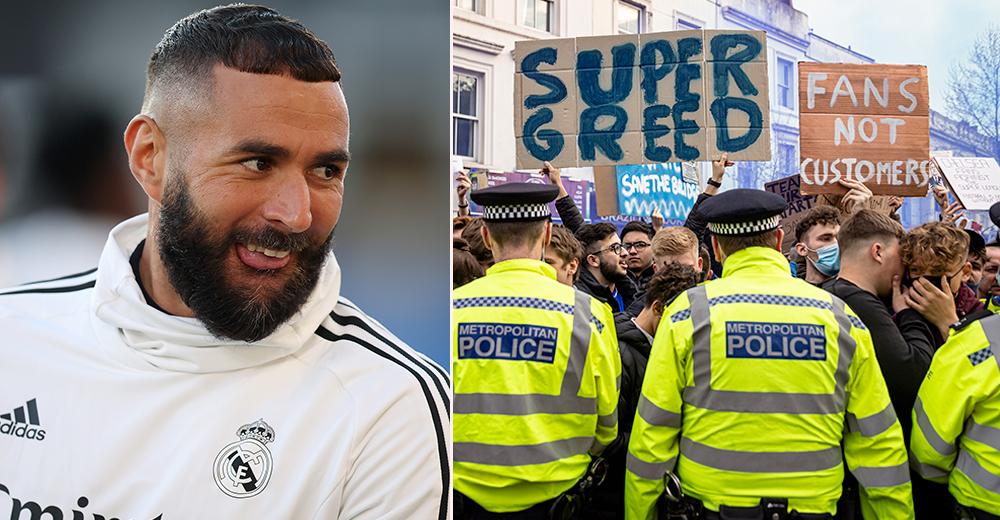
Some wanted to change the world of football, and many took to the streets and arenas to stop them.
Ongoing revolution.
Why was she so quiet?
It was seen as a declaration of war, if you remember. A little over a year ago, twelve huge football clubs presented their vision for the future of football. The Super League will be launched, it will generate billions, and it will dig a chasm between it and the rest of Europe.
FIFA Angry, angry league unions, angry supporters, angry politicians, outraged the opinion economy on social media, and the most angry was. UEFA– President Alexander Severin.
I found it useful, because football suffers from a severe lack of ideological debate. Here, everything is suddenly on the table: is it right to undermine the competition? Is it reasonable for adults to lock themselves with their billions in a cellar that has been converted into a television set? Is it fun to watch Liverpool face Real Madrid in the World Cup final every two weeks?
number! Heard from the streets and pulpits.
Then the volume was reduced.
As if nothing happened
What we got wasn’t a discussion about what a map should look like, just a wild sign that it couldn’t look like the giants of Italy, Spain, and England. It is as if nothing has happened since then, anyone who has been genuinely curious about a process that has been the most decisive in European football in a generation has had to read cables and news articles that seem to have crossed broad levels. Barcelona, Real Madrid and Juventus, two member clubs and an aristocratic club owned by the same family, continued to move forward with a new strategy. This summer, Simon Cooper of the Financial Times revealed that a Barcelona executive had tried to bribe UEFA to circumvent financial play rules while the club was mired in debt, and Juventus, suffering from years of failed investment, had to admit (insulted!) They are not the favorites in Serie A, and Real Madrid celebrated the CL title once again.
They have given up on the tactic of saying what they want – they are instead fighting what they don’t want.
It is a battle that will affect all those interested in European football, as it is about how the stadium will look forward. It’s easy to understand why these particular clubs want to push the fray, in a world where oligarchs and state-owned clubs threaten to blow up what little competition remains. How will Barcelona, burdened with debt, be able to reach the level of Manchester City in ten years? With Paris Saint-Germain?
Tonight, Real Madrid plays the European Super Cup final, facing Eintracht Frankfurt in Helsinki. At the same time they face UEFA in the courtroom.
A month ago, the stakeholders of the Superliga project, the three clubs and the A22 consortium, presented their arguments at a hearing at the European Court of Justice in Luxembourg. In their speeches, they launched a violent attack on UEFA’s monopoly position, which they said was in violation of UEFA’s laws on free competition. At Sportbladet, we publish an article on the debate written by nine expert professors and lawyers to show what the argument looks like. Examination of the authors shows that at least two of them are supporters of the rebel clubs. Paolo Bertinetti, Professor eremitus in Turin, for example? He founded the Juventus Friendship Association after the Calciopoli scandal. Gimede Gigante is a juventino. Many of the other professors are madridistas. and so on.
Here is the discussion article
Ruling next year
This winter there will be an opinion from the European Court of Justice, next year there will be a ruling that can redraw the world of football in which we have lived our lives. There are many reasons why we end up here, of course this is the case that the rebellious clubs are working for their own good, and they see competition threatening them (a battle between new and old money, be tough). Everyone understands that. But it’s also about UEFA, governance, and credibility.
If the broad reaction is that the big clubs should not be allowed to dominate football – does that mean that everyone also believes that UEFA has earned the right to do so?
Did they do a good job?
Under their indulgence, the competition was mortgaged, under their leadership, financial fair play became a paper tiger, under their umbrella the match program was drugged, the Champions League was plagued with elephantiasis, and broadcasters had to take charge.
When I spoke to A22 representative Anas Lagrare last winter, I asked him if the educational problem in the Premier League is that public opinion prefers the devil they know to the devil they don’t.
I agree one hundred percent, he replied. But we’re not looking to suggest a ready-made format, we’re just brainstorming.
The big mistake of the rebels
If the European Court of Justice gives them the right, if they fail to explain why the sport in particular should be exempted from competition laws, the plan is open to all other powers in major European football. New distribution keys, new institutions, and possibly new transparency.
The Superliga Rebels’ big mistake last time around was arrogance, as they thought they would face no opposition. Tonight, Real Madrid may win another trophy to put it next to the others in the cup room at the Santiago Bernabeu. Tomorrow they can, Juventus and F.C.B Free to think more about how football should be governed.
UEFA, FIFA and the People’s Court questioned their powers, how could they think they had the right to control this sport that was “made by the poor”?
Well, they can believe it because neither UEFA nor anyone else has seriously questioned it before. We get the world of football we deserve.
Anyone still want to brainstorm?

